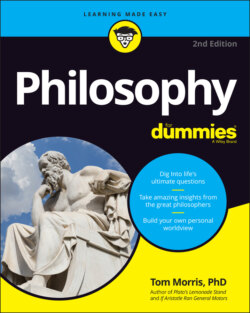Читать книгу Philosophy For Dummies - Tom Morris - Страница 55
Testimony
ОглавлениеSo here we go. The testimony of others is simply what other people say, and it happens to be your main source of belief about the past. Skepticism asks a simple question: How do you know that testimony is ever reliable? How do you know that what other people tell you is ever the truth? You get nowhere if you reason in a circle and say, “Well, when I was growing up, my parents told me that other people can usually be trusted, except where money and real estate are involved.” You can’t appeal to a special piece of testimony to justify ever believing testimony, or you have reasoned in a tight circle once more, assuming precisely what needs to be proved. The 17th-century English poet Francis Quarles issued this general warning about testimony and rumor: “Let the greatest part of the news thou hearest be the least part of what thou believest, lest the greater part of what thou believest be the least part of what is true.”
But suppose that in response to the skeptic’s question here, you say, “I just recall that many times in the past, what other people have told me has turned out to be true; so the testimony of others is in fact sometimes reliable.” If you reason like that, you are depending on your memory of past reliability for the testimony of others, and the only noncircular argument that you can give for the reliability of that memory appeals to testimony. But if you can know that memory is sometimes reliable only if you can reasonably believe that testimony is, and you can know that testimony is reliable only if you can reasonably believe that memory is, you just have on your hands a bigger circle of reasoning, and thus have gotten nowhere at all. You have not been able to produce a single piece of untainted, pure evidence that either of your distinctive sources of beliefs about the past is ever reliable.
Surely, you might think you’re on better footing when you examine your beliefs about the present. You can be vague about the past. It can be shrouded in the mists of time. But the present stares you in the face.
What are the distinctive sources for your beliefs about the present? Well, hmm. Gee, when you think about it, it seems that most of your beliefs about the present moment, about things going on beyond the purview of your own immediate perception, are based on the testimony of other people and your memory of what they’ve said. That’s how you know about current events around the world: testimony and memory. And you have just seen the wall you run into when you try to produce even a single shred of untainted evidence that either memory or testimony is ever reliable.
But this can get much more immediate. Even the testimony you remember comes initially through the medium of your own original sense experience. And many things that you know about the more immediate present, you know just from your current experience. This is how I know there is a blue cup on my desk and a steel watch with a black strap on my wrist. I see them. Perhaps sense experience can give the direct, provable tie to reality that the skeptic seems to be seeking. But, of course, the skeptic has challenging questions about sense experience as well.
